Rosanne Welch talks about “Why The Monkees Matter” with Jean Hopkins Power
Watch this entire presentation (45 mins)
Jean Powergirl takes the host reigns and welcomes her guest Rosanne Welch, PhD to the show! They’ll be discussing Roseanne’s book, “Why The Monkees Matter: Teenagers, Television and American Pop Culture.”
Transcript:
Rosanne: So between the two of them — Micky Dolenz sang most of the leads on the rock songs and Davy sang most all the ballads the girls remember and anything that had a girls name in it because that’s why the girls would by it because Davy was singing to them.
Jean: Singing to them personally.
Rosanne. Exactly. So he was — and it was funny in driving to your house today I didn’t realize that the exit off the freeway is 7a and that’s the phrase at the beginning of Daydream Believer which is his big hit. They have a little snippet of conversation on the album and he says ‘What number is this?” 7a is the number that they are recording at the time which is Daydream Believer so that’s known in Monkee circles as a very important number. I thought that was very — it said something about destiny of doing this recording.
Jean: It was meant to be.
A hit television show about a fictitious rock band, The Monkees (1966-1968) earned two Emmys–Outstanding Comedy Series and Outstanding Directorial Achievement in Comedy. Capitalizing on the show’s success, the actual band formed by the actors, at their peak, sold more albums than The Beatles and The Rolling Stones combined and set the stage for other musical TV characters from The Partridge Family to Hannah Montana. In the late 1980s, the Monkees began a series of reunion tours that continued into their 50th anniversary.
This book tells the story of The Monkees and how the show changed television, introducing a new generation to the fourth-wall-breaking slapstick created by Laurel and Hardy and the Marx Brothers. Its creators contributed to the innovative film and television of 1970s with projects like Bob & Carol & Ted & Alice, The Mary Tyler Moore Show, Laugh-In and Welcome Back, Kotter. Immense profits from the show, its music and its merchandising funded the producers’ move into films such as Head, Easy Rider and Five Easy Pieces.
Rosanne Welch, PhD has written for television (Touched by an Angel, Picket Fences) and print (Three Ring Circus: How Real Couples Balance Marriage, Work and Kids and The Encyclopedia of Women in Aviation and Space). In the documentary world she has written and produced Bill Clinton and the Boys Nation Class of 1963 for ABC NEWS/Nightline and consulted on PBS’s A Prince Among Slaves, the story of a prince from West Africa who was enslaved in the 1780s, freed by order of President John Quincy Adams in the 1820s and returned to his homeland.
Podcast: Play in new window | Download
Subscribe: RSS
![19: More on Davy Jones and The Monkees : “Why The Monkees Matter” Interview with Jean Power [Video] (0:44)](https://rosannewelch.com/wp-content/uploads/2017/09/rmw-power-19-davy-jones-2.jpeg)
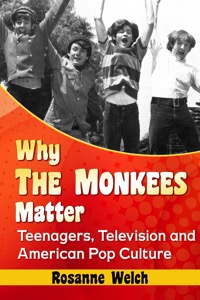


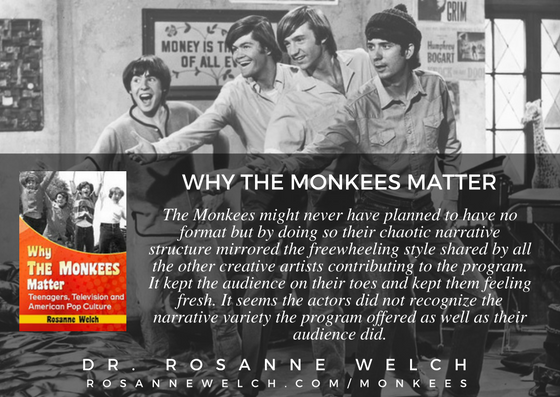
![18: Davy Jones and The Monkees : “Why The Monkees Matter” Interview with Jean Power [Video] (1:00)](https://rosannewelch.com/wp-content/uploads/2017/09/rmw-power-18-davy-jones.jpeg)

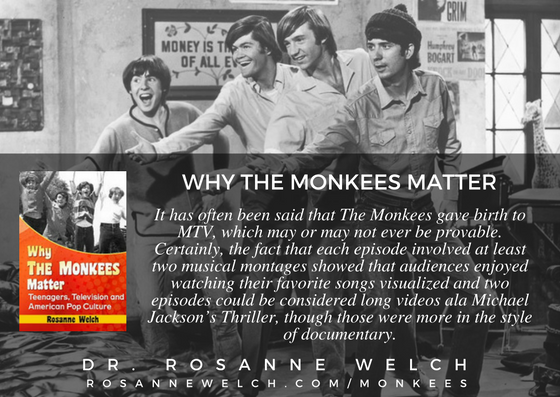
![17: Even More on Micky Dolenz and The Monkees : “Why The Monkees Matter” Interview with Jean Power [Video] (0:38)](https://rosannewelch.com/wp-content/uploads/2017/09/rmw-power-17-dolenz-3.jpeg)
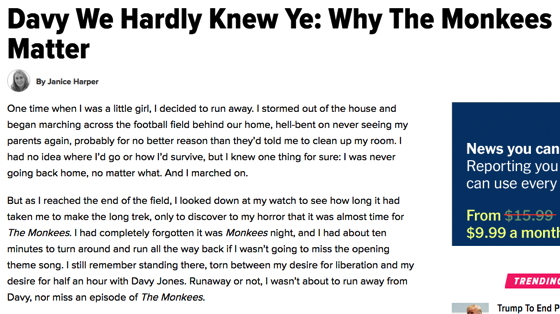
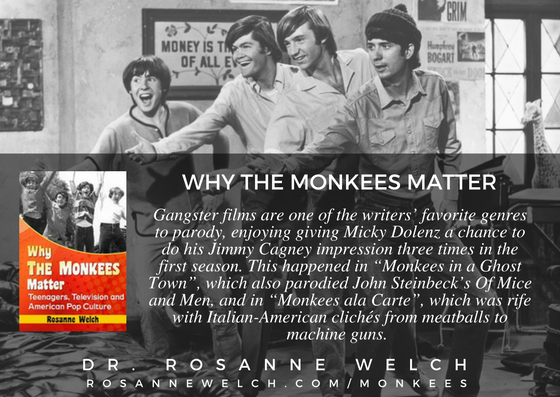
![16: More on Micky Dolenz and The Monkees : “Why The Monkees Matter” Interview with Jean Power [Video] (0:56)](https://rosannewelch.com/wp-content/uploads/2017/08/rmw-power-16-dolenz-2.jpeg)